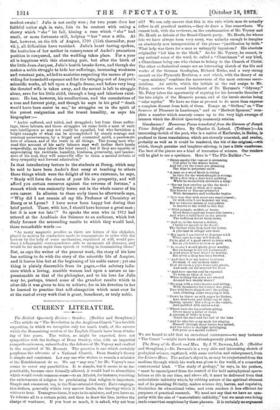• CURRENT LITERATURE.
The British Quarterly Review : October. (Hodder and Stoughton.) —The article on "The Revolution in the Anglican Church " is a forcible exposition, in which we recognise only too much truth, of the success which the Romanising section of the English Church have been obtain- ing of late years. The writer, as might be expected, does not sympathise with the feelings of Dean Stanley, who, with an impartial comprehensiveness, subscribed to the defence of Mr. Voysey and exulted in the acquittal of Mr. Bennett. 'The question is one which certainly perplexes the advocate of a National Church. Dean Stanley's theory is simple and consistent. Let any one who wishes to remain a minister of the Establishment do so. We say "any one," for Mr. Voysey's case seems to cover any possibilities. It is simple, but it seems to us im- practicable, because once formally allowed, it would lead to absurdities which would revolt common-sense—to an Atheist for instance, receiving the endowments of religion for proclaiming that religion is imposture. Simple and consistent, too, is the Nonconformist theory. Each congrega- tion define; generally within very narrow limits, the theology which it wishes to hear. Transgress these, it says to its minister, and you leave us. To tolerate all to a certain point, and then to draw the line, invites the charge of weakness. If you bear so much, it is asked, why not bear all? We can only answer that this is the rule which men do actualir follow in all practical matters,—they do draw a line somewhere. We- cannot look, with the reviewer, on the condemnation of Mr. Voysey and Mr. Heath as defeats of the Broad-;Church party. Mr. Heath, for whose- fate we have always been very sorry, was unlucky enough to imagine an absolutely new interpretation of the phrase "justification by -faith.' What help was there for a man so unhappily ingenious ? His absolute originality "led him to the block." As for Mr. Voysey, he cannot, in any rational sense of the word, be called a "Churchman" of any kind; a Churchman being one who claims to belong to the Church of Christ. The other ecclesiastical essays are an interesting sketch of the life and works of the German theologian, Richard Rothe, and a very strong• assault on the Plymouth Brethren, a sect which, with the theory of an "open ministry," combines the narrowness of the most extreme saner- dotalism. An article, which the initials at the end assign to Mr. Paley, reviews the second instalment of Dr. Haynian's "Odyssey" Mr. Paley takes the opportunity of arguing for his favourite theories Of the late origin of the Homeric poems, and of the heroic stories being "solar mythe." We have no time at present to do more than express,- a complete dissent from both of them. Essays on "Strike;" on "The- Sources of Pleasure in Landscape," and on "Herbert Spencer," cont. plate a number which scarcely comes up to the very high average of interest which the British Quarterly commonly.attains.


































 Previous page
Previous page